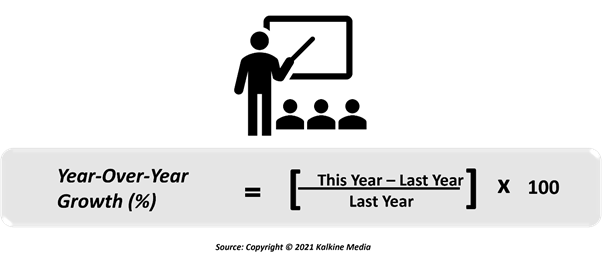What is Year-Over-Year (YOY) growth?
Year-over-Year (YOY) is a financial assessment method used to compare 2 or more quantifiable events on an annual basis. The YOY metric allows to determine the performance of financial instruments via financial metrics, which include sales revenue, net earnings, EPS and overall economic situation of countries through inflation, GDP, unemployment, etc.

Image source: © 2021 Kalkine Media
Any quantifiable event that occurs yearly may be compared through this metric.
YOY evaluations are a common and effective approach to assess a company's financial performance and the success of investments.
Summary
- Year-over-Year is used to evaluate 2 or more quantifiable events on an annual basis.
- YOY performance can tell how a company’s financials or economies are performing on a YOY basis.
- YOY growth rate negates the seasonality effect on data and makes it easy to understand.
- However, few problems can arise in its calculation.
- YOY growth rates are frequently used by investors to assess if a stock’s financials are doing good or bad.
Frequently Asked Questions (FAQ)-
Why is YOY approach effective?
YOY is an effective way to assess growth because it removes seasonal effects. Any monthly variability is smoothed down by the YOY growth rate. An individual may check his/her reported business figures to the same time last year instead of seeing big rises and dips between seasonal months.
For example- If sales of a business increased 30% in the month of July 2021. However, you might check that sales had risen in the same month last year as well. Hence, it is quite possible that the sales might rise during this time of the year. If sales usually increase by 40%, then the business actually did worse this year.
How is YOY calculated?
Before calculating YOY growth rate, an individual/company must see what it wants to find YOY growth for if it is revenue, number of employees or any other financial/economic metrics. After this, the time period must be determined if YOY growth has to be measured for 2 distinct years.
YOY growth is calculated by subtracting last year’s figure with this year’s figure and then divided by last year’s number.
When this number is multiplied by 100, YOY growth is turned into a percentage.
Here is the formula for calculating YOY growth rate-

What is the difference between YOY and MOM growth rates?
Month-Over-Month growth is a measurement of a statistic’s adjustment in value as a percentage of the value in the previous month.
So, if an individual has just launched a new business and wants to know how many more orders he will get in the second month than in the first, month-over-month growth will be used to find out. Quarter-over-quarter growth can also be used to assess performance over 2 quarters.
However, YOY growth rates are used if the business wants to find out how many more chocolates did it sell this year compared to last year.
What is a good YOY growth rate?
There is no ideal YOY growth rate.
A good YOY growth rate varies from one entity to other, depending on factors like type of business, its goals and products, industry, market, competition, etc.
How can YOY growth help in other ways?
YOY measurement can help in seeing if the business is showing a yearly growth or a monthly one, if there are any long-term patterns and if there is any improvement. This can help the business in concluding what is working and what is not working for the business. Such an information can be quite valuable for lenders, bankers and decision makers who need measures on company’s growth.
Moreover, Investors want to look at YOY numbers before providing capital to companies that help them in deciding if a particular investment is good or not.
YOY growth rates can also assist businesses in spotting any errors and inconsistencies in books that might have occurred due to improper recording of a metric. These growth rates can help businesses in forming the right business strategy as well.
YOY metric provides results in percentage terms, which allows assessing companies of different sizes as part of market and competitor evaluation.
What are some of the problems that may arise in calculating YOY growth?
Some problems may arise in using YOY growth. This measure is inefficient for underlining short-term changes. Further, it will not benefit a new company or one that has been in existence for less than 13 months as there is no preceding year to compare data with. In such a case, monthly or quarterly comparisons can be done which are calculated in pretty much the same way as YOY.
YOY growth rate also provides meaningless results if one time period had negative results. When computed over a few time periods to indicate patterns, YOY statistics gives a lot more information, but it doesn't truly convey enough of a company's growth narrative until it's combined with other measures.
 Please wait processing your request...
Please wait processing your request...